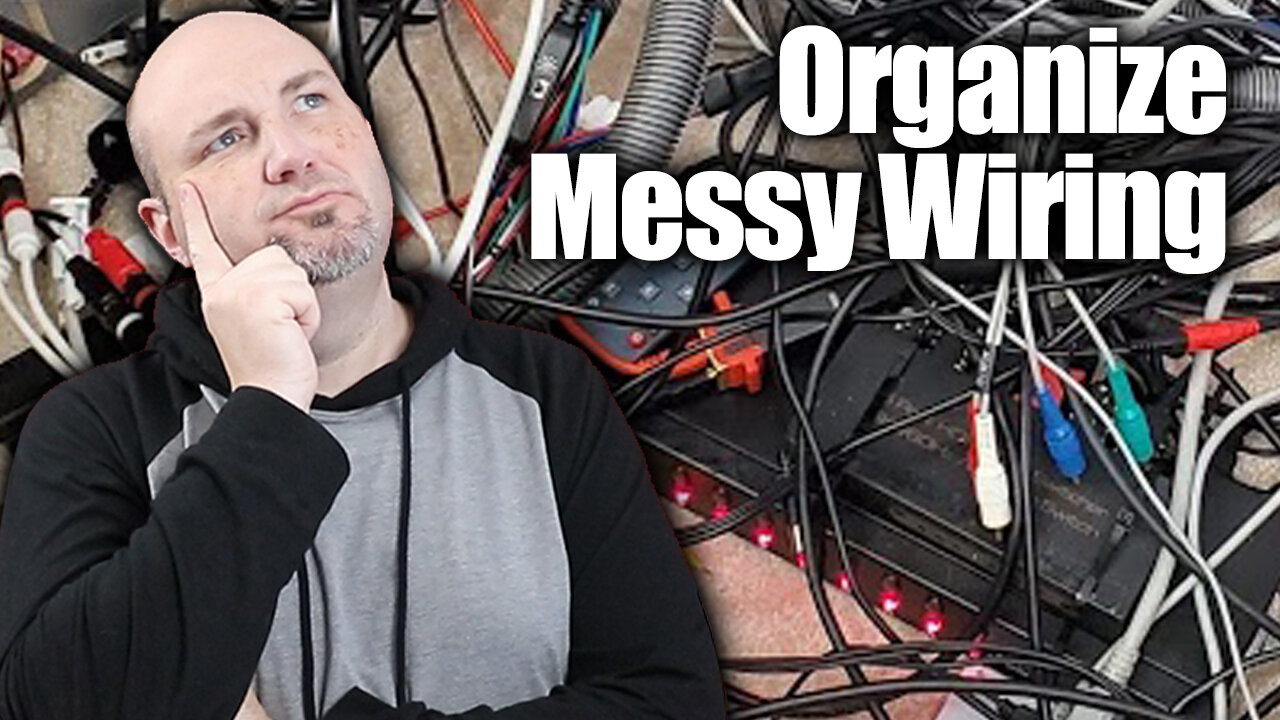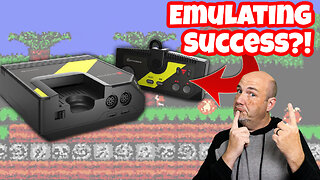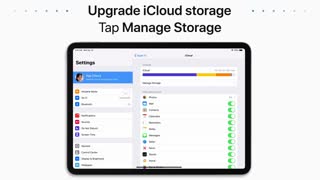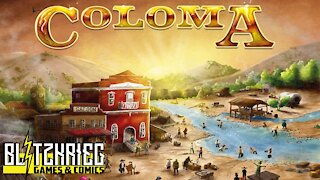Premium Only Content

How To Use Peg Board to Help Manage & Organize Your Game Room Wiring
In this episode, we show you How To Use Peg Board to Help Manage & Organize Your Game Room Wiring
For the longest time, I have had an issue keeping my gaming wiring neat and clean. I've tried using things such as zip ties, split loom tubing, and wire wraps as cable management to keep my wiring as neat as possible. I had looked for better ideas for a long time and finally came up with an idea to use peg board cable management to organize and streamline my wiring setup.
My project started with a trip to my Local Menards store, where I picked up the pegboard itself, some screws, wire brackets, and counter-sunk washers. I also picked up some L-brackets to help provide some additional support and strain relief from the weight of the cables as well. Finally, I had the idea that I could use my Dremel tool to cut the peg board down to size, as I had seen a vertical router bit I thought would work for the job. To hedge my bets I also picked up some saw blade bits too, just in-case. Oh, and of course I had to grab some Sprecher Cherry Cola and one of their new Citrus Splash to stay hydrated during the project.
I also headed to Harbor Freight to pick up a 12-outlet strip for just $20. I wanted to better space out my AC Adapters for my systems. While this is just an outlet strip and doesn't provide any surge protection, I plugged it into another surge protector, so all is good there. In total I would use 2 surge protectors, this one 12-outlet strip, and a single 6-port USB power supply to power different systems and accessories in my setup.
Back home, I laid the peg board down on a set of tables and began to take my measurements. I knew that the area I was working with was roughly 58 inches by 30 inches, so that's what I marked out on the peg board. From here I connected the router bit attachment to my Dremel and got to cutting. Or at least I tried to get to cutting. To say my expectations and reality were not the same would be a wild understatement as I could not get a straight line to save my life! Thankfully, my Father-In-Law had a handheld compact circular saw and he powered through the cuts I needed quickly and easily. One of things we did to make sure that we had a straight cut was to clamp a board to the peg board to use as a guide, and it worked wonderfully.
With the peg board cut, I mounted it to the back of the Kallax stand. I opted to add some L-Brackets to the bottom and sides of the stand, and these helped provide additional strength and stability just as I wanted. I next broke out my hole saw and created the holes I needed to route all of my cabling though the peg board. From here, it was time to dust off everything, clean my systems and reinstall them into the Kallax. From here, the work really began.
The goal was to loop and wrap my cabling, keeping everything off of the floor. I wanted to group my Component Cables separate from my SCART cables, and keep all that separate from the HDMI cables, and I was pretty much able to do this. I was also able to route all of my power cables similarly, using a combination of split loom tubing, wire tires, the wire brackets I purchased, and some additional peg hooks I forgot I even had. I spent 3-4 nights working on the wiring, a few hours at a time, until I finished and everything was as I wanted.
The benefits of this has already been proven. I've needed to get back behind my Kallax a few times as I have knocked a few things back behind the stand because, well, I'm clumsy. Being able to get back behind here, tweaking the wiring and cleaning things up has been amazing! While not done yet, once I have my HDMI mods completed for both my N64 & Dreamcast I can quickly and easily route my new HDMI cables for these systems without adding to a rats nest. Overall, this is something I wanted to do for some time and hopefully I have inspired you to clean up your wiring messes.
#CableManagement #OrganizeGames #HideWiring #WireOrganization
The footage used in this review are used under the Fair Use laws, referenced below:
https://www.law.cornell.edu/uscode/text/17/107
Notwithstanding the provisions of sections 106 and 106A, the fair use of a copyrighted work, including such use by reproduction in copies or phonorecords or by any other means specified by that section, for purposes such as criticism, comment, news reporting, teaching (including multiple copies for classroom use), scholarship, or research, is not an infringement of copyright.
The fact that a work is unpublished shall not itself bar a finding of fair use if such finding is made upon consideration of all the above factors.
(Pub. L. 94–553, title I, § 101, Oct. 19, 1976, 90 Stat. 2546; Pub. L. 101–650, title VI, § 607, Dec. 1, 1990, 104 Stat. 5132; Pub. L. 102–492, Oct. 24, 1992, 106 Stat. 3145.)
-
 22:39
22:39
RoXolidProductions
26 days ago $0.08 earnedEmulation Success OR Clone Failure? Hyperkin Retron GX Review
1981 -
 2:39
2:39
WFTX
4 years agoFoods that can help you manage your mood
22 -
 1:59
1:59
JJongkon
4 years ago $0.01 earnedDIY Tricks to Organize Your Kitchen
36 -
 2:16
2:16
jpf1981
4 years agoHow to upgrade and manage your iCloud Storage
37 -
 7:05
7:05
JasonHartman
4 years agoHow to Manage Your Property Manager
38 -
 5:06
5:06
DungeonsAndCofeeRPGshow
4 years agoH.P. Lovecraft: Innsmouth Board Game
79 -
 2:34
2:34
stephenskaren001
4 years agoOrganize your shower
108 -
 1:02
1:02
KTNV
4 years agoNational Board Game Day
519 -
 15:17
15:17
Blitzkrieg Games
4 years agoColoma Board Game Unboxing
25 -
 14:46
14:46
Blitzkrieg Games
4 years agoMaracaibo Board Game Unboxing
561